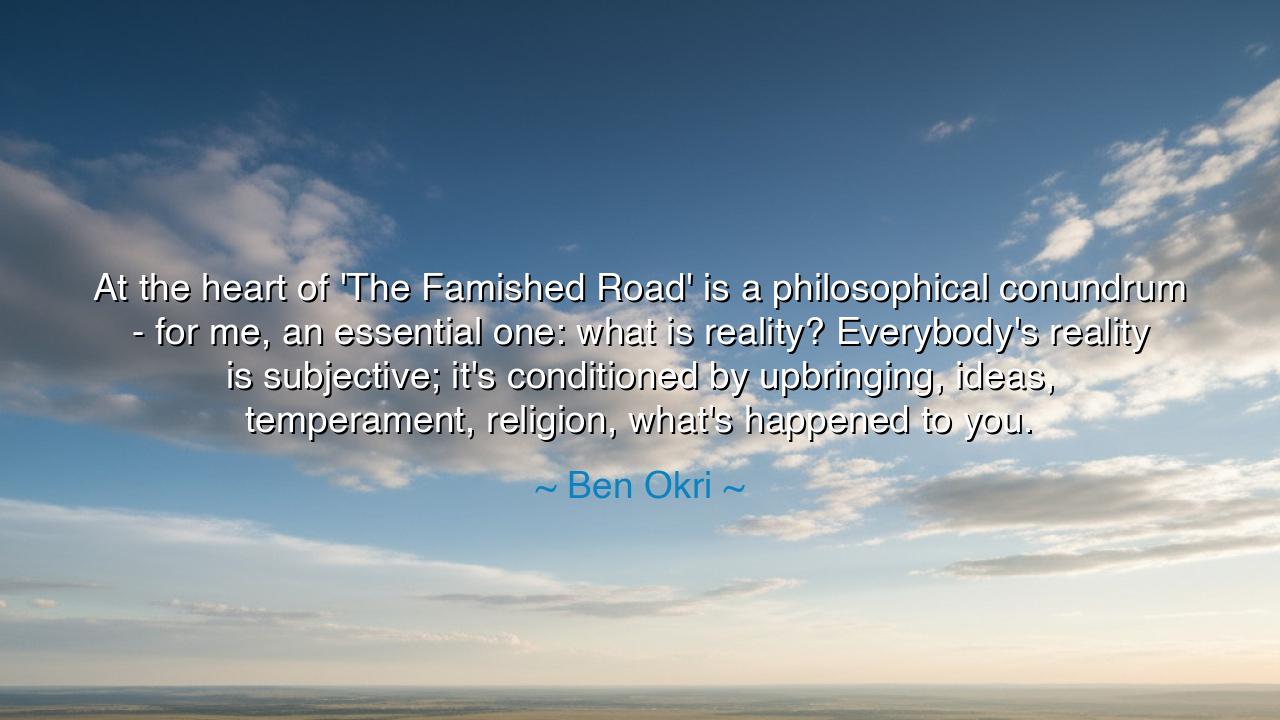
At the heart of 'The Famished Road' is a philosophical conundrum
At the heart of 'The Famished Road' is a philosophical conundrum - for me, an essential one: what is reality? Everybody's reality is subjective; it's conditioned by upbringing, ideas, temperament, religion, what's happened to you.






"At the heart of 'The Famished Road' is a philosophical conundrum - for me, an essential one: what is reality? Everybody's reality is subjective; it's conditioned by upbringing, ideas, temperament, religion, what's happened to you." – Ben Okri.
In these words, Ben Okri speaks to the heart of one of humanity’s oldest and most profound questions: What is reality? It is a question that has echoed throughout the ages, from the halls of ancient philosophers to the minds of modern thinkers. What Okri reveals is not simply that reality is perceived differently by each person, but that it is deeply conditioned by factors beyond the individual’s immediate control—by upbringing, culture, temperament, religion, and the personal experiences that shape our understanding of the world. In this sense, reality is not a single, fixed entity, but a mosaic of experiences and perceptions, each unique and distinct.
The ancient Greeks, in their pursuit of wisdom, spoke of the subjectivity of perception. Plato, in his Allegory of the Cave, suggested that what we perceive as reality is but a shadow of the true world, shaped by our limited understanding. The prisoners in the cave, chained and forced to look at the wall, could see only the shadows of objects behind them, and thus they believed the shadows to be the entirety of existence. But only when one escapes the cave can they experience the world in its fullness—a world that has been distorted by their previous perceptions. Similarly, Okri’s exploration of reality in The Famished Road speaks to this tension between the subjective and objective worlds, where what we know is often shaped by the stories we are told and the lives we lead.
Consider the life of Leonardo da Vinci, a man whose understanding of the world was a complex blend of art, science, and spirituality. Leonardo’s reality was not confined to the narrow view of the world that others held, but was shaped by his innate curiosity and constant exploration of nature and the universe. He did not see the world as others did—his understanding was deeply personal, conditioned by his upbringing in Renaissance Florence, but also influenced by his insatiable quest for knowledge. In this way, Leonardo exemplifies Okri’s assertion: reality is subjective and varies according to the lens through which we view it, shaped by individual experience and mindset.
In Eastern philosophy, particularly in Buddhism, the notion of reality is fluid, often described as an illusion or Maya, shaped by the individual’s mind. The Buddha taught that suffering arises when we cling to a distorted sense of self and reality, rooted in ego, attachment, and ignorance. True enlightenment, then, comes when one sees through the veil of personal perception, understanding that the self and the world are interconnected and ever-changing. In this sense, both Buddhism and Okri’s statement point to a similar truth: reality is not a fixed entity, but something that is **






AAdministratorAdministrator
Welcome, honored guests. Please leave a comment, we will respond soon